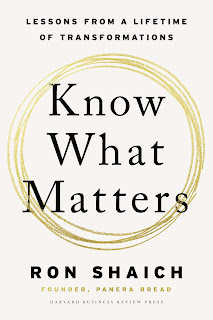Today brings the new book by Ron Shaich, founder, and former CEO of Panera Bread. It’s called, Know What Matters: Lessons From A Lifetime Of Transformations.
Shaich offers clear-headed lessons for the entire life cycle of an enterprise, from bootstrapping a startup to going public to managing large companies to selling a business. He challenges readers to grapple with how business impacts life, sharing his own struggles and setbacks with as much honesty and candor as he describes his successes.
The primary four transformations Shaich led were:
- Evolving Au Bon Pain (his predecessor company) from a simple French bakery to a chain of bakery cafes – a platform shift that set the stage for new opportunities in the space between fast food and fine dining.
- Discovering, through careful observation of customer behavior, a whole new paradigm within the restaurant category that became the $100 billion-plus fast-casual segment.
- Recognizing the potential of Panera Bread to become a nationally dominant brand and the decision to bet everything on that brand.
- Reinventing Panera completely, when he had more than two thousand stores that were feeding one in thirty Americans every week. That reinvention included transforming the ordering systems and completely overhauling the back end to ensure efficient delivery.
As you read the book, you’ll discover Shaich’s rules for gaining and maintaining competitive advantage:
Recognize that you can’t please all people all the time. Understand who your target customer is and what job they are hiring you to do. Develop a concept that’s the singular best choice for some target customers on some days rather than the second-best choice for everyone, every day.
Define what competitive authority means within your understanding of your concept and know how you will build it.
Make sure the niche you focus on is big enough to sustain you, but not so easily duplicated that you simply become an R&D lab for larger competitors.
Search for the good ideas that really matter.
Build barriers to entry.
Get it done. Execution is everything.
Accept that maintaining competitive advantage is really difficult.
Be willing
to do it all over again. Competitive advantage is fleeting. Don’t wait for
your competitors to pass you before seeking out a new opportunity.
Ron Shaich
Finally, some of Shaich’s life lessons include:
- Tell yourself the truth.
- Know what really matters.
- Make smart bets.
- Conduct an annual pre-mortem.
Even if you are not the one in thirty Americans visiting Panera Bread every week, you’ll find Shaich’s book fascinating, inspirational, compelling, and full of wise and practical business lessons to give you the confidence to master transformation.
Thank you to
the book’s publisher for sending me an advance copy of the book.


Comments
Post a Comment